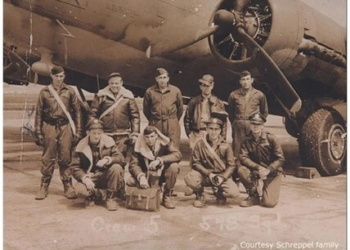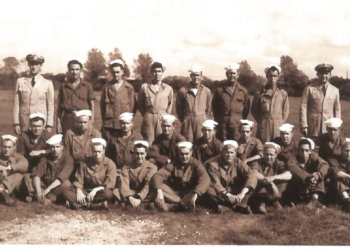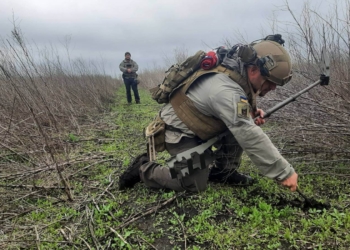Bob Rupp is a 101-year old veteran who served in World War II at the Battle of the Bulge. After military service, he didn’t slow down or seek a traditional retirement. Instead, he found another way to serve.
He and his wife, Matilda, have spent years flying to Guatemala to become honorary grandparents and mentors to children rescued from poverty or human trafficking through the Institute for Trafficked, Exploited & Missing Persons. Together, the couple has touched hundreds of lives and made a difference in Central America, even though they barely speak Spanish.
Rupp entered the Army in June 1941 as a ROTC second lieutenant. He originally planned to do one year of service to complete his requirement, then look for a job. Instead, when the Japanese bombed Pearl Harbor he extended his service for 4 1/2 years. Rupp ultimately spent 37 years in the Army — most of that time in the Active Reserve.
He was assigned to the 3rd Field Artillery Battalion and trained with them before arriving in the Belgium-Luxembourg area in September 1944. According to Rupp, things were quiet for a few months, but that changed in December when the Germans attacked on a 78-mile front that became known as the Battle of the Bulge. He shares his account of the battle.
“We held our position, denying an entire German Infantry Division access into Luxembourg City. We laid down constant fire on all approach areas — an average of one round every 40 seconds, night and day, over a five-day period, which set an Army record for sustained fire. And, more important, it established what became the South Shoulder of the Bulge.
“As Service Battery C.O., it was my job to replace the nearly 6,000 rounds fired by Third guns. I off-loaded equipment from all but my kitchen truck, put two drivers in each cab and a loading crew in the back and split the trucks into two trains. I can’t remember being out of my Jeep for the next five days.
“We made 100- to 150-mile turnarounds, night and day. We were on the move constantly, traveling blackout at night. Luckily, and somewhat miraculously, we made it back to our guns each trip, which wasn’t easy. One wrong turn could have put us into a Jerry position because things were very fluid; there was no front line. But our guns never went without ammunition, even when they were firing an average of one round every 20 seconds, which they did for one 48-hour period.”
After active duty, Rupp remained in the Active Reserve “partly because I liked it, but also because it was an easy way to build retirement income.” He adds, it’s important to stay involved in a project that keeps you active because “staying active makes life more interesting and gives you a reason to get up in the morning.”

One unique way the Rupps stayed active after military retirement was by volunteering with ITEMP in Guatemala. Initially, they became involved in the program because Matilda Rupp was lifelong friends with the mother of ITEMP’s founder, Patrick Atkinson.
In 1991, Atkinson founded The GOD’S CHILD Project. He had worked with runaways, homeless youth and children who were victims of domestic violence in the U.S., Central America, and Southeast Asia. The children in Central America called him padrino,which means godfather, and he came to see the rescued children as his “godchildren.” Twenty-eight years later, the project has rescued over 80,000 children from poverty in the slums, war-torn villages or human trafficking situations. Children are then placed in foster homes to be raised in a safe environment.
Later, he added ITEMP as a sub-program of The GOD’S CHILD Project. After personally witnessing a raid in Malawi where women and children were rounded up into cattle trucks, “and bound in gunny sacks to be used for camel jockeys, sex purposes, farm hands, or domestic servants,” he was shocked to realize that this level of human trafficking was occurring in the modern world.
Worse, he was disappointed that there was no international outcry, so he created a program to lead the way for anti-human trafficking efforts in the Western Hemisphere. ITEMP focuses on “community education & prevention, detecting the problem, investigation, interdiction & rescue, rehabilitative services, community change, and prosecutorial assistance.”
Atkinson has been thrilled with the Rupps’ involvement in ITEMP.
“Bob is amazing. He co-raised an entire generation of Guatemalan orphans. The children came out of unstable environments and needed a strong, safe presence. What Bob and Maddie did was use their tremendous experience: they were the perfect “grandparents” to offer a safe and stable environment to those kids. They would travel to Guatemala between 3-6 months each year. They would live there and come to work every day. They did that year after year, which became a very stabilizing trusted force for children,” Atkinson said.

And the relationship has been mutually beneficial as Bob Rupp found purpose through his work with ITEMP.
“Part of the attraction of working at GOD’S CHILD was doing something worthwhile; part was being around a group of upbeat volunteers; part was the warm sunshine and meeting the “ex-pats” who had left the U.S. to live in a laid-back country.”
ITEMP has also benefitted from a steady stream of veteran volunteers, like Rupp, because it’s a perfect fit for military families: it’s non-denominational, ecumenical, non-political, Atkinson explained.
He expresses gratitude for the service in and out of uniform provided from members of the military community.
“The people keeping the United States free from those who want to hurt us are the military service members. The people supporting them are the family members. My sincerest gratitude to all of them. I’ve travelled a lot, but when it’s time to come home, I know where I want to go — back to the United States.”
Visit https://www.itemp.org for information on volunteer opportunities.







































